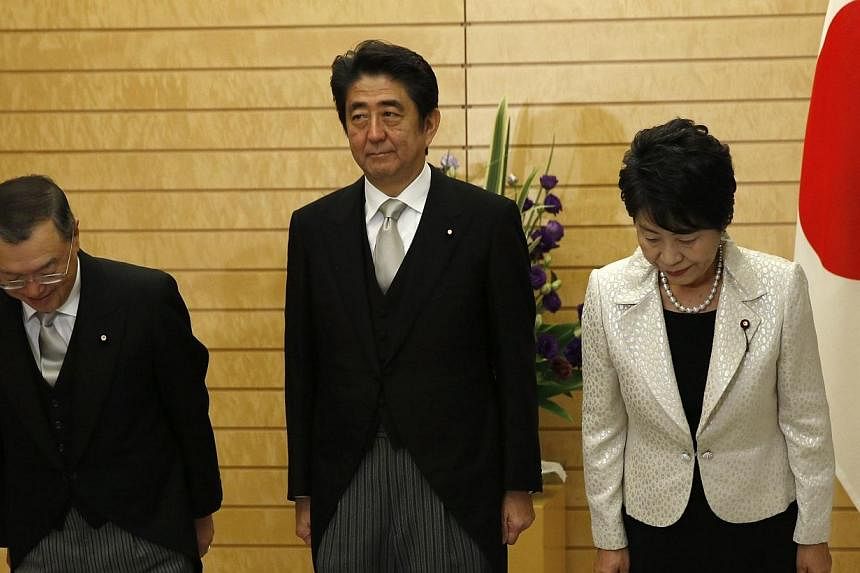TOKYO - Japanese Prime Minister Shinzo Abe is facing increased pressure from a newly energised opposition over potential scandals within his cabinet even though he swiftly jettisoned two ministers this week in a bid to calm the storm.
Three other cabinet members - Defence Minister Akinori Eto, Agriculture Minister Koya Nishikawa and Health Minister Yasuhisa Shiozaki - have already publicly faced questions over alleged influence peddling, improper donations or problems in reporting on political funds. All three have denied wrongdoing.
But the opposition, routed by Abe's Liberal Democratic Party (LDP) in the last national elections, is scenting blood.
"They see this as an opportunity to turn things around,"said a former opposition Democratic Party lawmaker who did not want to be identified.
Domestic media are also reminding readers that Abe's first 2006-2007 term as premier was plagued by serial resignations that eroded his support, ending when he quit abruptly in the face of parliamentary deadlock and ill-health - although experts are not at present predicting a replay of that scenario.
On Monday, Yuko Obuchi, the daughter of a prime minister often mentioned as a contender to be Japan's first female premier, quit as trade and industry minister after acknowledging doubts over whether her support groups misused political funds.
Hours later, Midori Matsushima stepped down as justice minister over allegations, which she rejected, that she handed out paper "uchiwa" fans to voters, a violation of election law.
She said she had quit to avoid being a "drag" on Abe's administration. Matsushima's alleged infraction was minor, but she lacks political clout and Abe let her go to try to deprive the opposition of ammunition to snarl parliament, analysts said.
Abe's popularity has already slipped to just below 50 per cent in a weekend Kyodo news agency survey, at least partly due to the scandals. But whether the furore dies down or spirals into a bigger problem depends largely on whether fresh scandals gain traction, political experts and insiders said.
"I think Abe is handling it quite well," said Gerry Curtis, a Columbia University professor.
"Pulling the plug so fast was exactly the right thing to do rather than let it fester." But he added: "If it cascades, it will be big trouble."
However, the opposition remains weak and the LDP lacks an obvious immediate challenger, so Abe is not yet at serious risk of losing his job, political experts said.
That means the biggest potential damage could be to a planned rise in the sales tax to 10 per cent from October 2015 that is needed to rein in Japan's huge public debt but is unpopular with voters.
Abe's administration had been virtually untouched by scandal since he returned to office in December 2012, but that changed after he reshuffled his cabinet in early September.
In recent weeks, Defence Minister Eto corrected his political funds report for what he called a "simple human error", Agriculture Minister Nishikawa told parliament he had returned donations from a failed livestock firm involved in an investment scam, and Health Minister Shiozaki denied using his influence on behalf of a nursing home in his district.
In other possible headaches, National Public Safety Commission chairwoman Eriko Yamatani has denied she knew that people with whom she was photographed in 2009 belonged to a right-wing group now known for "hate speech" demonstrations.
Internal Affairs Minister Sanae Takaichi acknowledged she had been photographed with the head of a fringe Neo-Nazi party, but she said she was unaware of his extremist views at the time.
The scandals have given new life to an old Japanese proverb.
"Don't straighten your crown under a plum tree," new trade minister Yoichi Miyazawa said after he was chosen to replace Obuchi, quoting a saying that means even an innocent act could lead to suspicions of stealing fruit.
"One must resolutely uphold the ethics that are required as a politician," he said at his first full news conference on Tuesday.

